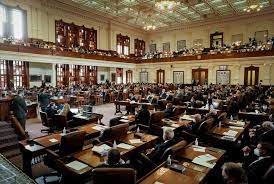
The legislative session has completed its eleventh week. 10 weeks to go. Here’s what’s happening:
Senate Passes Property Tax Reduction Measures

The Texas Senate unanimously approved several measures that would reduce overall property taxes for homeowners and in turn, appropriate billions of more dollars into public education spending. The package of bills totals $16 billion, including both the cuts and the new spending on education. The series of bills raises the homestead exemption, which would raise the amount of a home’s value that cannot be taxed from $40,000 to $70,000; reduces overall property tax rates; and pumps nearly $6 billion in new state dollars into the public school system.
These proposals now head to the House, which is taking a different approach to property tax reductions. Instead of addressing the homestead exemption and rate reductions, the House caps the amount that appraisals can rise from year to year to 5%. Annual appraisals are currently capped at 10%. The House Ways and Means committee has approved the House measures relative to the reduction in appraisal caps, and the bills will head to the floor in the coming weeks. Once both chambers have passed their versions of proposed property tax reductions, the two chambers will have to work out their differences in a conference committee. At this point, leaders from both chambers are defending their respective approaches and are not showing signs of willingness to compromise.
House Committee Approves State Budget

On a 23-3 vote, the House Appropriations committee has approved the 2024-25 state budget, totaling $302 billion, with $136 billion of the total coming from state general revenue funds. Key provisions are the above mentioned nearly $17 billion buy down in property taxes and $6 billion in new funding for education; a 5% raise for state employees; $3.5 billion for cost of living adjustments for retired teachers; $3 billion to increase funding for mental health services; and $350 million to replenish the Governor’s economic development account used to recruit businesses to relocate to the state. There is still room for more spending. Lawmakers entered the session with a record $33 billion surplus in state funds, but the product voted out of committee leaves over $20 billion still to spend, if lawmakers choose to do so. The full House will vote on the appropriations bill on Wednesday, April 5th, right before they break for the long Easter weekend. The Senate will vote on their version of the budget shortly thereafter, and then the bill will go to conference committee, where final budget decisions are made.
Proposals to Change Session Schedule

The Texas Constitution has set up the legislative process to make it difficult to pass legislation in Texas. Even when only meeting once every other year, the session has restrictions on when during the session that lawmakers can consider bills. The constitution prescribes the first 30 days of the session are reserved for filing of legislation only. The next 30 days are reserved only for filing of bills and committee hearings. Therefore, under current practice, the legislature cannot begin to consider any legislation on the floor until after the 60th day. Many Republican lawmakers this session have publicly declared that the legislature should be allowed to consider bills from the beginning of session, and not have to wait to pass bills. Hence, they want to pass more laws while they are here in Austin.
The Senate State Affairs Committee this week approved a measure to do just that. The proposal would allow the legislature to start holding committee meetings and pass bills on the floor as soon as the legislature convenes. If this proposal passes the legislature, it will then go to a vote of the people since the proposed changes requires an amendment to the state constitution.
Proposal to Deny Bail

The Texas Senate has approved a proposal regarding the denial of bail that would apply to a wider range of offenses, specifically violent crimes such murder, kidnapping, robbery, sexual assault and assault with a deadly weapon. The Texas Constitution currently grants defendants the right to a pretrial hearing unless they have been charged with capital murder or have repeated violent offenses. This proposal would authorize judges to deny bail under “clear and convincing” circumstances to ensure safety to the community or to ensure the defendant will appear at future court proceedings. State leaders have pointed to the rising number of defendants charged with additional crimes while out on bond – specifically in Harris County. This public safety related argument has been voiced mostly by Republicans on the campaign trail, but this particular proposal passed the Senate with only one Democrat opposing the measure.
Gaming Bills Heard in House Committee

Proposals to legalize sports betting and bring Las Vegas style casinos in Texas were heard in the House State Affairs Committee this week. The proposals to legalize sports betting limit the activity to online platforms only, making no provisions for physical locations for sportsbooks. The legislation is supported by all of the state’s professional sports teams, and allows for the betting on all pro sports, as well as Texas based horse racing. The casino legislation proposes to allow 8 destination type resorts to specific areas of the state including Houston, Dallas, Austin, San Antonio, Corpus Christi, and the Rio Grande Valley. The proposal also calls for the authorization of casino gaming for the state’s three federally-recognized Tribes. Currently, the three Tribes in Texas – The Alabama-Coushatta in Livingston, the Ysleta del Sur Pueblo in El Paso, and the Kickapoo in Eagle Pass – are legally operating gaming facilities in Texas. This proposal also creates a new Texas Gaming Commission that would authorize the new licenses, as well as regulate the industry moving forward. Several casino companies testified in support of the bill and declared the proposal would consistently bring nearly $3 billion in new revenue annually to the state. Religious groups, as well as far-right interest groups opposed both proposals. The Governor and Speaker of the House have not endorsed either of the proposals, but have publicly said they would listen and consider the legislation.
The bills have high hurdles to clear. Any attempt to bring expanded gaming to Texas would mean the proposals ultimately have to be put to a vote of the people to amend the state constitution. That requires the legislation to be approved by 2/3rds of both the House and Senate. In the Senate, that means 21 of the 31 members of the Senate would have to vote for the proposed amendment to the constitution. Lt. Governor Dan Patrick has not been supportive of these proposals in past sessions. And the effort to pass gaming was dealt a blow yesterday when Patrick declared in a radio interview with Chad Hasty from KFYO in Lubbock that the votes are not there in the Senate to pass either the sports betting or casino proposals.
Political Notes
Former President Trump will hold a rally at Waco Regional Airport tomorrow in what will be the first Texas stop for his 2024 White House bid. Trump has consistently run strong here, and is still popular among Republican primary voters. Last month, 56% of likely primary voters responding in a University of Texas Politics Project poll conducted last month said he should run again.
Activity this Week
Both chambers met Monday through Thursday of this week. The House is still doing only procedural and ceremonial resolutions, but will have their first floor calendar on Tuesday.
What’s Next??
The House and Senate have adjourned for the week. The House and Senate will convene at 2PM Monday.
Next week, the House Youth Health and Safety Committee will hear two bills related to school safety, including the creation of a new fund to support projects related to school safety.
The Senate Business and Commerce Committee will continue to hear bills related to the electric grid and ERCOT regulations.
Also next week, the full Senate will debate legislation requiring the Governor to call a special session when a statewide emergency declaration has been declared, such as was the case during the pandemic. The Senate will also debate legislation relative to limitations on participation by transgender athletes in college competitions, and prohibitions related to gender related health care.
When lawmakers return Monday, there will be 63 days remaining in the session.
